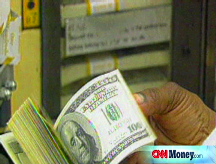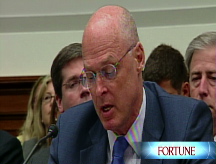Fannie bailout? Hold on a second
The stocks are swooning, but the feds are understandably in no hurry to own the whole U.S. mortgage business.

NEW YORK (Fortune) -- The frenzied trading in shares of Fannie Mae and Freddie Mac seems to assume the government will soon ride to the rescue of the mortgage giants.
But the cavalry is in no rush to get to the scene - because for the moment, federal intervention is unnecessary, not to mention tricky and politically unpalatable.
"The government doesn't want to own these companies," FBR Capital Markets analyst Paul Miller said Wednesday on Bloomberg television.
Fannie (FNM, Fortune 500) and Freddie (FRE, Fortune 500) shares tumbled for the fourth straight day Wednesday, a day after Freddie paid its biggest premium in a decade to sell $3 billion of five-year reference notes. The companies' shares hit their lowest levels in nearly 20 years, dropping below the levels they bottomed out at last month in the panic that led Treasury Secretary Henry Paulson to propose a government-funded backstop that was later passed into law by Congress.
The selloff in the companies' shares and their rising borrowing costs have led to some talk that Paulson, just a month after proposing that the Treasury be authorized to invest in the companies, will have no choice but to recapitalize the companies. Given the terms of the government's mid-March rescue of Bear Stearns - shareholders ended up getting $10 a share for a stock that just a year earlier traded for 17 times as much - the widespread assumption is that any bailout for Fannie and Freddie would effectively wipe out common shareholders, and perhaps preferred shareholders as well.
One suggestion batted about in the media would have the government buying preferred shares that are senior to all existing stock; others contemplate use of an explicit government guarantee, rather than a cash infusion.
But despite the collapse of their stock prices and the ominous trends in the housing market that point to losses down the road, Fannie and Freddie aren't in dire need of cash right now. Though FBR's Miller says he believes each company will need to raise $15 billion or so to survive the housing bust, for now both companies remain above the capital levels required by their regulator, the Office of Federal Housing Enterprise Oversight.
Fannie chief Dan Mudd said Wednesday that the company is churning out record profits on its new business, thanks to the collapse of the private mortgage industry competition. And though their borrowing costs have surged, Fannie and Freddie are still able to borrow in the debt markets - meaning a Bear Stearns-like cash crunch isn't imminent.
Even so, investors suspect more bad news is ahead. One event that could force the government to act on the companies' behalf would be a failure of Fannie or Freddie, each of which is facing more than $100 billion in maturing debt in coming months, to sell new debt into the markets.
In its debt sale Tuesday, Freddie paid investors 113 basis points over the yield on comparable Treasury notes - up 60% from the spread Freddie paid in May, and double the average spread over the past decade, Bloomberg reported. The rising yields on Fannie and Freddie debt come as Asian central banks slow their purchases of agency debt, and as bond investors elsewhere seek to limit their exposure to the financial services sector after a year of writedowns and other shocks.
If Fannie or Freddie can't find new buyers for their debt, Treasury would face the difficult task of supporting the companies without either rewarding shareholders or exposing additional problems in the financial sector.
While some bailout scenarios being discussed would wipe out preferred shareholders as well as common shareholders, FBR's Miller notes that holders of Fannie and Freddie preferred stock include some regional banks, which are already under pressure from the collapse of residential real estate values and the slowdown in commercial lending markets. Were a bailout plan to reduce or wipe out the value of those preferred shares, banks that hold Fannie or Freddie preferred shares could face big writedowns that would add to their capital problems.
Wilmington Trust (WL), a small Delaware lender, took an $8 million hit in the second quarter on the decline of the value of its holdings of Fannie and Freddie preferred shares, though the firm said it planned to continue holding the shares, because "they pay dividends, they have investment-grade credit ratings, and their valuations are expected to normalize over the course of market cycles."
Another group that could take a hit in a preferred-stock haircut is big insurers. Among the top holders of Fannie and Freddie preferred issues are Hartford Insurance (HIG, Fortune 500), Allstate (ALL, Fortune 500), Genworth (GNW, Fortune 500) and Liberty Mutual Insurance, all of which have largely sidestepped the credit issues hitting the markets over the past year.
Paulson is no doubt eager to avoid intervening less than three months before the electorate chooses the next president. Paulson said last month that he hoped not to have to use his authority to invest taxpayer money in the companies, and has made clear that he would rather see the companies remain shareholder-owned, in hopes that Fannie and Freddie can raise new money on their own. The swoon in the companies' shares seems to be making an intervention more likely - but far from certain.
"We doubt that the Bush administration will embrace a nationalization of the mortgage market in front of the elections," Jeff Miller, CEO of investment adviser NewArc Investments in Naperville, Ill., wrote in a post on his Dash of Insight blog earlier this week. "This issue will be confronted incrementally and reluctantly." ![]()
-
 The retail giant tops the Fortune 500 for the second year in a row. Who else made the list? More
The retail giant tops the Fortune 500 for the second year in a row. Who else made the list? More -
 This group of companies is all about social networking to connect with their customers. More
This group of companies is all about social networking to connect with their customers. More -
 The fight over the cholesterol medication is keeping a generic version from hitting the market. More
The fight over the cholesterol medication is keeping a generic version from hitting the market. More -
 Bin Laden may be dead, but the terrorist group he led doesn't need his money. More
Bin Laden may be dead, but the terrorist group he led doesn't need his money. More -
 U.S. real estate might be a mess, but in other parts of the world, home prices are jumping. More
U.S. real estate might be a mess, but in other parts of the world, home prices are jumping. More -
 Libya's output is a fraction of global production, but it's crucial to the nation's economy. More
Libya's output is a fraction of global production, but it's crucial to the nation's economy. More -
 Once rates start to rise, things could get ugly fast for our neighbors to the north. More
Once rates start to rise, things could get ugly fast for our neighbors to the north. More











